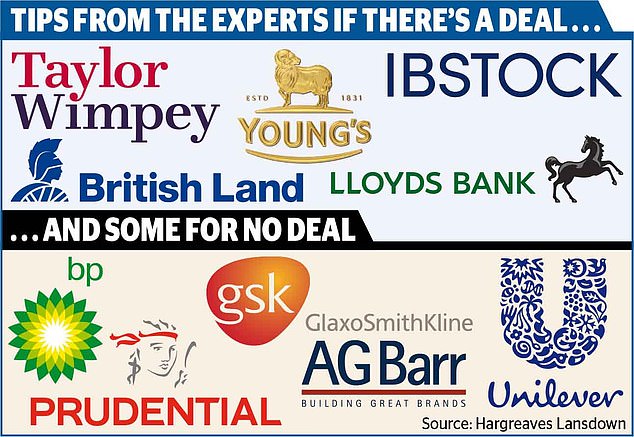Brexit has given UK investors a lot of food for thought. While the pound dropped after the referendum, as traders tried to digest what leaving the EU would mean for the economy, the effect on the stock market has been more subtle.
The FTSE 100 index fell sharply in the aftermath of the 2016 vote, but recovered to hit a record high in May.
Although it has fallen 10 per cent since then, it is still 12 per cent above where it was before the referendum.


Likewise the FTSE 250 has slumped 13 per cent since its high in June this year as Brexit crept closer, but is 9 per cent higher than it was before the vote.
Yet the generally positive performance masks differences between the sectors.
Whole industries have seen their shares depressed amid fears that any type of Brexit could shake the UK economy.
Cutting ties with continental Europe could stunt economic growth, so the argument goes, making consumers less willing to spend.
Big High Street banks have also struggled to buck up their shares for similar reasons, as they are largely at the whim of consumers and businesses.
With political turmoil gripping Westminster, as MPs debate whether to back Theresa May’s withdrawal deal, many investors are wondering what to do.
RELATED ARTICLES
Previous
1
2
Next

Brexit Plan B: How are supermarkets preparing for a ‘no…

Drowning our sorrows: Pub group Greene King says it’s making…

The Santa Rally is real: Investors banking on a December…

MINOR INVESTOR: Where can you invest with protection?

Rise of passive funds could be a blessing in disguise for…
Share this article
Share
HOW THIS IS MONEY CAN HELP
How to choose the best (and cheapest) DIY investing Isa – and our pick of the platforms
In the event of a no-deal Brexit, when all economic fears would be amplified and the pound could plunge, big international companies which make chunks of their earnings in other currencies are buffered on two counts.
Firstly, they are less dependent on the UK consumer, and secondly, if the pound falls, this would make their foreign earnings more valuable when converted back into sterling.
Danny Cox, of Hargreaves Lansdown, says stocks such as drugs giant Glaxosmithkline, oil firm BP and Marmite-maker Unilever should be reliable in the event of a no-deal Brexit.
Patrick Thomas, investment manager at Canaccord Genuity Wealth Management, recommends funds such as Scottish Mortgage Trust or Polar Capital Healthcare.
Both have international exposure and are focused on tech and healthcare respectively – areas which are likely to keep growing regardless of Brexit.
Steve Davies, manager of the Jupiter UK Growth Fund, has also been reducing exposure to domestically focused stocks and ploughing it back into international businesses.
Davies emphasises that he hasn’t sold any of his bread-and-butter UK companies entirely. In fact, he believes their fundamentals to be strong, but that adding diversity is prudent.
Poll
Are UK shares a value opportunity?
Yes
240 votes
No
70 votes
Now share your opinion
James Klempster, head of investment management at Momentum, is wary of trying to predict politics. But though he too has been weighting towards overseas-focused companies, he believes many UK firms are looking strong beneath the sterling risks.
Indeed if a Brexit deal is agreed, the same companies which have taken a battering could see shares shoot up.
Firms such as Lloyds Bank, Taylor Wimpey and brick maker Ibstock could be good bets for investors confident of a more orderly Brexit, Cox says.
For anyone who is completely negative on their outlook, Thomas suggests the so-called absolute return sector of investment funds.
Options such as the Personal Assets Trust and Ruffer Total Return can hold assets like gold and currencies, and though they tend to be on the back foot when markets are rising, volatility and uncertainty is often their friend.